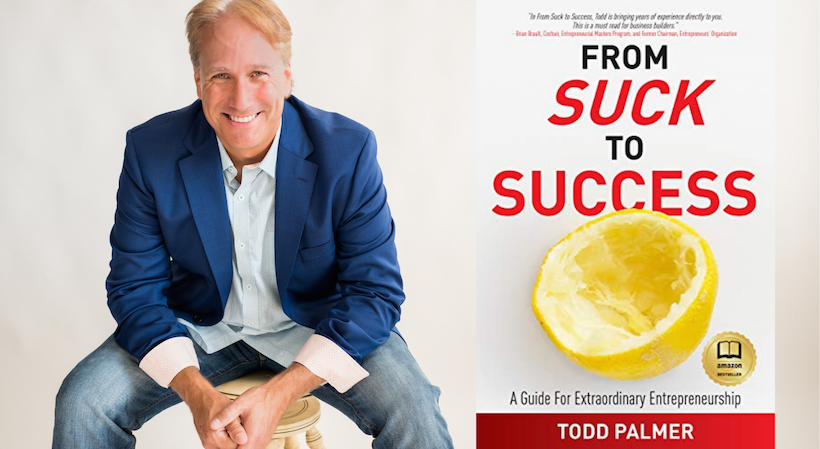The following is excerpted from “From Suck to Success: A Guide for Extraordinary Entrepreneurship” (Tulip Media, February 26, 2021).
StartupNation exclusive discounts and savings on Dell products and accessories: Learn more here
Branding yourself
When I work with entrepreneurs about building stronger, more successful businesses, one of the first concepts we work to improve is their branding. It might sound counterintuitive, but it’s true. You and everyone around you needs to know who you are as an entrepreneur. That helps everyone make better decisions about you. The same is true for your business. When you, your team, and your customers know who you are as a business—and who you are not—it helps everyone make better decisions in your business. That’s why it’s so important to be intentional about branding yourself and your business.
So, if you want to get and stay on the right trajectory toward success for your business, don’t do anything else until you have your business brand established. Your brand is your business’s reputation. It calls attention to your business—the right attention, if you do it well. Similar to your “why” or ikigai, you may try several different “brands” for your business before you figure out who you are and who you aren’t.
Importantly, clear branding helps avoid one of the biggest problems many entrepreneurs face: trying to be all things to all people. It’s the solution to the problem because it lets everyone know who you are and who you aren’t.
“A lot of entrepreneurs are not intentional about the brand, or very rarely think about the brand, when they create a business,” says brand expert Deb Gabor, author of “Brand Is Sex” and “Irrational Loyalty.” “And so many brands go to market being a great solution to a problem and having some kind of unique bell or whistle. But when you don’t pay attention to creating a brand that creates an emotional bond with your customer, you’re opening yourself up for competition.”
As Deb explains, your brand:
- Protects you from competitive threats,
- increases the financial viability and value of your business,
- allows you to scale more rapidly and more profitably, and
- provides a tangible financial benefit to the organization.
“People’s brains love and need stories,” Deb says. “Your brand is a shortcut for the story of how you elevate your customers’ self-concept. If ice cream brands marketed themselves on the basis of ‘It’s cold, and it’s sweet, and it comes in three different sizes,’ there wouldn’t be Ben & Jerry’s. There wouldn’t be Häägen-Dazs. There wouldn’t be as many people who buy ice cream. But when you have a very strong brand that creates a condition of irrational loyalty, it increases sustainability and profitability and contributes a tangible financial value to the overall valuation of the company.”
When I first started my business, I had built Diversified Industrial Staffing to be a generalized staffing agency. That meant I was being evaluated against real generalized staffing agencies. Unfortunately, generalized staffing agencies had razor-thin margins and, often, long payment cycles. While that worked for companies large enough to have deep pockets to take on loss-leader-type volume business, it nearly made me bankrupt. When I decided to rebrand my business to be a more niched staffing agency, I was able to break free from what my clients expected of a bigger agency and shift their expectations to those of a niched agency. I was able to do this because we focused on serving the candidate—not the client—first. The job candidate was the center of the increased demand/diminished supply equation. By focusing on the candidate piece of the employer/employee relationship dynamic, we were no longer a commodity staffing provider.
We had the candidate who was in demand. This allowed me to quickly raise my margins and shorten my receivable timelines.
This can be a big struggle for entrepreneurs who are so used to running around putting out fires all day—especially the ones who are also the chief arsonist in their business. Pausing to take a bigger-picture look at their business landscape and look at where they can own a market can feel like something they don’t have time to do. And they’re so stressed out that it’s hard to even know what they want to do.
A perfect example of starting as generalists and becoming more specific upon learning the market (a focusing exercise most entrepreneurs call niching) would be my nieces Sara and Lindsay. Like most entrepreneurs, they became more successful as they got more niched. They started out as a healthcare staffing company focused on providing physical therapists, occupational therapists, and speech therapists for hospitals and rehab facilities. Sara and Lindsay soon pivoted into public school settings— providing services to kids with autism—once they discovered the demand was high and that great behavioral healthcare providers were in short supply. Then they got extremely specific and further discovered a subcategory of registered behavioral technician (RBT) and board certified behavior analyst (BCBA) healthcare providers who were difficult to find with a strong growing demand.
Next, they decided to take a geographically targeted approach and went from serving 12 states in the western United States to just one: California. Sound counterintuitive? Sure, but it works. There is a saying that you can either go a mile wide and an inch deep or a mile deep and an inch wide. By narrowing their focus, Sara and Lindsay were able to scale almost immediately. They went a mile deep, and it paid off.
Sometimes we think more is better. Most times, “more” simply dilutes the effort, and you miss the magic of leveraging once you decide on your path.
Once they became known as the go-to company in California, Sara and Lindsay had suitors lined up to buy their quickly growing healthcare business. After 10 years of growth, Sara (37) and Lindsay (32) decided to sell their company in 2019 to a larger strategic competitor, the Stepping Stone Group. The combined company now stands as the single largest company of its type in the United States, with revenues approaching nearly a half a billion dollars.
My experience with branding myself continued long after I turned around Diversified Industrial Staffing. In fact, I might have had an even harder time branding my coaching business before I figured out who I was and who I wasn’t. It took me two to three years to determine that my sweet spot was helping entrepreneurs and CEOs make the necessary (and frequently uncomfortable) changes to achieve their full business and personal potential. I made progress during those two to three years, but once I really branded myself, everything took off.
Related: How to Add Value to Your Target Audience Through Emotional Branding
How your brand protects you during turbulent times
Your brand doesn’t just help you get noticed in good times. In fact, it’s probably more important for you during turbulent times, like the COVID-19 pandemic or the Great Recession of the late 2000s. As Deb Gabor and many other brand experts will tell you, how your brand shows up and acts when times are tough says more about you than what it does when times are good.
That applies on a macro- and micro-scale, too. On a micro-scale, if you have a company you’re restarting, reigniting, and bringing back to market, start with your brand.
“It’s a demographic psychographic imperative today that you have a brand, because that is how people make decisions—95 percent of buying decisions happen outside of what’s rational,” says Gabor. “They happen in the heart. I sometimes talk to people who have great ideas. They’re selling better mousetraps. And you can’t sell mousetraps to people who don’t have mice. You can’t sell mousetraps to those who don’t believe that mice are a problem. It’s really hard to sell a better mousetrap if people don’t have the why behind things. And your brand is the why.”
Here are Gabor’s tips on better branding:
- Aim your brand at a singular, ideal, archetypal customer. This is not a demographic profile. It’s not like, “We’re for busy moms.” I could sit in a room of 100 people who were all busy moms, and they would all differ based on the ages of their kids, what they do inside and outside the home, where they live, who they’re married to. Are they married or not married? You can find an “avatar” by asking current customers or clients what they value about your business. Asking questions create patterns to help reveal the ideal client.
- Elevate your customers’ self-concept through the use of their brand. Everybody lives their lives in accordance with Maslow’s hierarchy of needs. At the most basic level, they need to take care of their physiological needs. At the highest level, they want to achieve self-actualization. Your brand is all about helping people navigate that hierarchy. If people associate getting closer to self-actualization by doing business with you, the stronger their bonds with you will become.
- Be singular. Figure out the one thing you offer that no one else can. The best brains in the world are not the ones that are simply “different.” It’s not enough to just be somewhat different than others. You have to be unique to truly stand out. Carve out your uniqueness. What is unique to you that no competitors can provide? By doing this, we draw in our ideal client. At the same time, we weed out clients who may not work so well with us. This can make entrepreneurs uncomfortable since they can’t be all things to all people.
- Make your customer the hero in your world. In other words, your brand is about your customer, not you. If you go to your company’s website and the first word is about you (such as highlighting your company name or the word “we”), you’re doing it wrong. Talk directly to your ideal customer on your website.
Sign Up: Receive the StartupNation newsletter!
While branding yourself won’t completely smooth out the loops on the looping line of success, it will make them smaller and provide forward momentum for your business. And without a specific brand, nobody will know who you are, what you can do for them, or how you’ll help them rise up Maslow’s hierarchy of needs.
“From Suck to Success: A Guide for Extraordinary Entrepreneurship” is available now and can be purchased via StartupNation.com.






